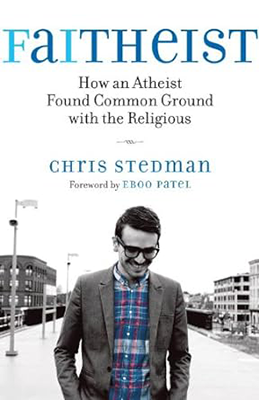Faitheist
“Faitheist: How an Atheist Found Common Ground with the Religious” is a book by Chris Stedman, published in 2012. Stedman, a former evangelical Christian turned atheist, shares his personal journey of grappling with questions of faith, identity, and community, ultimately advocating for greater understanding and cooperation between atheists and religious believers. Here’s a summary:
Main Themes:
Personal Journey: Stedman recounts his upbringing in a conservative evangelical Christian household and his eventual rejection of religious belief during his teenage years. He describes the challenges he faced coming out as gay in a religious community that condemned homosexuality and the internal conflict he experienced as he struggled to reconcile his identity with his faith.
Encounter with Atheism: Stedman discusses his transition from Christianity to atheism and his involvement in secular activism and atheist communities. He reflects on the sense of liberation and empowerment he found in embracing atheism, as well as the hostility and mistrust he encountered from some religious individuals and communities.
Bridge Building: Despite his atheism, Stedman emphasizes the importance of building bridges of understanding and empathy between atheists and religious believers. He argues that both groups share common values and concerns, such as social justice, compassion, and the search for meaning and purpose in life, and that they can find common ground in working together for the common good.
Interfaith Work: Stedman advocates for greater engagement between atheists and religious communities through interfaith dialogue and cooperation. He describes his own experiences participating in interfaith initiatives, such as volunteering with religious organizations and collaborating on social justice projects, and highlights the potential for atheists to contribute positively to interfaith efforts.
Key Concepts:
– Intersectionality: Stedman explores the intersections between atheism, religion, identity, and social justice, emphasizing the importance of recognizing the diverse experiences and perspectives within both atheist and religious communities. He calls for an inclusive approach that acknowledges the complex interplay of factors that shape individuals’ beliefs and identities.
– Humanism: Stedman embraces humanism as a guiding philosophy that emphasizes reason, compassion, and ethical living. He argues that humanism provides a common moral framework that can unite atheists and religious believers in addressing shared challenges and advancing shared values.
– Civility and Respect: Stedman advocates for civility, respect, and empathy in discussions about religion and atheism. He encourages atheists to engage with religious believers in a spirit of goodwill and open-mindedness, recognizing the dignity and worth of all individuals regardless of their beliefs.
Legacy:
“Faitheist” has been praised for its thoughtful exploration of atheism, religion, and interbelief dialogue. Stedman’s personal narrative and call for cooperation and understanding between atheists and religious believers have resonated with readers from diverse backgrounds, sparking conversations about the intersections of faith, identity, and activism in the modern world.

